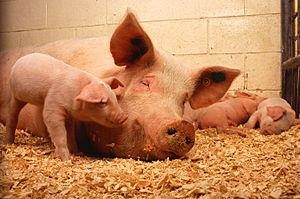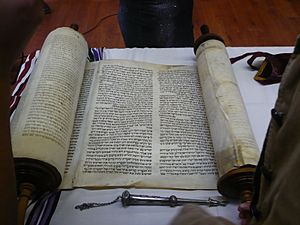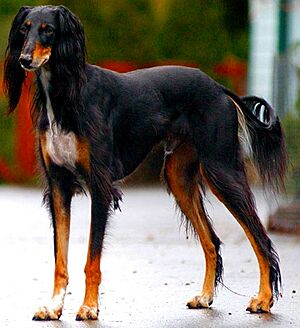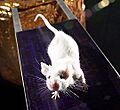Unclean animal facts for kids
In some religions, an unclean animal is an animal that people are not allowed to eat or even touch. These rules are often part of a religion's dietary laws. If someone touches an unclean animal, they might need to perform a special cleaning ritual to become "clean" again.
Contents
Unclean Animals in Judaism
In Judaism, the idea of "unclean animals" is a big part of Kashrut, which are the Jewish laws about what foods are allowed (kosher) or forbidden. These rules come from the Torah (the first five books of the Hebrew Bible), especially the books of Leviticus and Deuteronomy. Jewish rabbis have also written many commentaries on these laws in the Talmud.
The Book of Genesis also mentions unclean animals. In the story of Noah's Ark, Noah was told to bring both "pure" and "impure" animals onto the Ark.
The Torah names some animals as pure or impure. For others, it gives characteristics to help people decide. Sometimes, it's hard to know exactly which animal a Hebrew name refers to.
For an animal to be "pure" or kosher, it must also be healthy and killed in a special way called Shechita. If an animal is impure or not killed correctly, its products (like meat or milk) are also not kosher. For example, some types of gelatin were avoided, but now kosher gelatin is available. Also, certain parts of even kosher animals, like blood or some fat, are forbidden.
It's also against the rules to cook meat and milk together. This is why many Jewish homes use separate kitchen utensils for meat and dairy foods.
How Animals Are Classified
The Torah doesn't use modern science groups like mammals, fish, reptiles, or birds. Instead, it groups animals by where they live (land, air, water). Because of this, the rules for kosher food don't apply to all mammals or all birds in the same way. However, we can figure out the rules for each type of animal from the Bible.
Mammals
For land animals to be kosher, they must do two things:
- They must chew their cud (meaning they chew their food twice).
- They must have split hooves.
This means that only certain mammals can be kosher. These include animals like cows, bison, sheep, goats, deer, and antelope. They must be plant-eaters, not meat-eaters. Even though a giraffe fits these rules, it's not traditionally eaten because there's no long-standing Jewish custom for it.
All other mammals are forbidden. This includes "crawling creatures" like mice and flying mammals like bats. Water mammals like whales and dolphins are also not kosher because they don't have fins and scales, which are required for water creatures.
Animals that only have one of the two characteristics (like chewing cud but not having split hooves, or vice versa) are also unclean. For example, the camel, hyrax, and hare chew cud but don't have split hooves. The pig has split hooves but doesn't chew cud, so it's also explicitly called unclean.
Fish
To be eaten, water creatures must have both fins and scales. This means that only certain fish can be kosher.
Other water creatures like crabs, lobsters, shrimp, and snails are not kosher. They either don't have fins and scales or have an outer shell (an exoskeleton) instead of an inner skeleton and gills like true fish.
Birds
The Torah lists some birds that are not allowed to be eaten. However, it's not always clear exactly which birds these Hebrew names refer to. Because of this, many Jewish communities only eat birds that have a clear tradition of being kosher, like chickens, turkeys, and ducks.
The book of Leviticus lists some birds that are not kosher. These include:
Bats are also mentioned, even though they are mammals, not birds.
Insects
The Torah allows some "winged swarming things" (insects) to be eaten, but forbids others. However, because it's hard to be sure about the exact Hebrew names for insects, rabbis today usually say that all insects are unclean.
One exception is certain types of locusts. Some Jewish communities, especially from Yemen, traditionally consider them kosher.
Bees' honey is considered kosher because it's not made from the bees themselves, but rather collected by them.
Why These Rules?
Some people think that the Jewish rules about "unclean animals" were created to keep people healthy. In ancient times, some of these animals might have been more likely to cause food poisoning or spread diseases.
Other scholars, like Mary Douglas, believe the rules have a deeper meaning. She suggested that animals were called "unclean" if they didn't fit neatly into certain categories. For example, a pig was seen as "ambiguous" because it has split hooves like kosher animals but doesn't chew cud.
Unclean Animals in Christianity
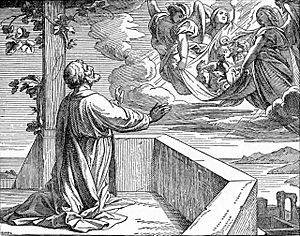
In the very early days of Christianity, there was a big discussion: Should new Christians follow all the Jewish customs, including food laws? At a meeting called the Council of Jerusalem (mentioned in the Bible in Acts 15), they decided that new non-Jewish Christians didn't need to follow all the strict Jewish dietary laws. They only needed to avoid meat offered to idols and blood.
Most Christians today believe that the Old Testament food rules were changed with Jesus's new teachings. This idea is called supersessionism. However, some Christians, often called Torah-submissive Christians, believe they should still follow these rules.
Some groups, like the Seventh-day Adventists, argue that if all Old Testament food laws were removed, it would mean things like alcohol, tobacco, rats, and cockroaches would be considered "clean food." They believe God doesn't change his mind about what is an "abomination."
Supporters of the stricter view also have a different way of understanding Peter's vision (in Acts 10). They say that God wasn't telling Peter that all foods were now clean. Instead, God was teaching Peter not to call non-Jewish people "unclean," because salvation was now for everyone. Peter himself explains this later in Acts 10:28.
One modern Christian group that follows some of these older dietary laws is the Seventh-day Adventist Church. They often choose to be vegetarians and avoid foods like pork and shellfish, which are considered "unclean" in the Bible. While vegetarianism is not a strict rule, many Adventists choose it for health reasons. Other Christian churches that keep the Sabbath (like the United Church of God) also avoid unclean meats.
Ethiopian and Eritrean Orthodox Tewahedo Churches
In both the Ethiopian and Eritrean Orthodox Tewahedo churches, people are encouraged to follow kosher diets. Eating meat from pigs and other non-kosher animals is strictly forbidden in these churches.
Unclean Animals in Islam
In Islam, some animals are considered unclean and forbidden to eat (harām). Others are allowed (halāl), as long as they are killed in a proper way with blessings given to God.
The Quran (Islam's holy book) clearly forbids eating "the flesh of swine" (pork). No other "impure animals" are directly named in the Quran. If someone becomes a Muslim, Allah "allows them as lawful what is good and prohibits them from what is bad."
For other animals, how they die is very important. Forbidden foods include blood and dead animals (carrion). Also forbidden are animals that died from strangling, a hard blow, falling, or being gored. If a wild animal has started eating an animal, it's also forbidden unless a person can kill it properly before it dies.
The Quran also forbids food that has been offered to other gods or sacrificed on stone altars. Food killed by someone who worships idols is forbidden, but food that is acceptable to Jews and Christians is allowed for Muslims.
Dogs
Most Sunni Muslim scholars say that dogs can be kept by farmers, hunters, and shepherds for hunting and guarding. The Quran even says it's okay to eat what trained hunting dogs catch. Among the Bedouin people, saluki dogs are loved as companions and allowed inside their tents.
According to a Sunni Islam Hadith (a saying or action of the Prophet Muhammad), if a dog eats from a plate, that plate must be washed seven times, including once with clean sand mixed with water, before a person can eat from it.
Images for kids
 | John T. Biggers |
 | Thomas Blackshear |
 | Mark Bradford |
 | Beverly Buchanan |


